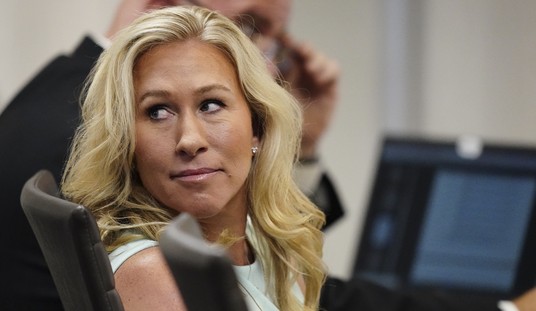He sure does, says Team Cruz.
But the key to victory, Cruz advisers believe, is to be the second choice of enough voters in the party’s libertarian and social conservative wings to cobble together a coalition to defeat the chosen candidate of the Republican establishment…
To them, the Republican primaries are a series of single-elimination brackets where the four GOP leaders who best represent the party’s libertarian, establishment, social conservative and tea party wings will survive as the field winnows. Cruz will vie for the support of the tea party electorate, his advisers say, but will fare well enough with social conservative and libertarian voters to assemble a powerful coalition.
Red State’s Dan McLaughlin elaborates:
Cruz path: 1) Walker stumbles 2) Jindal, Perry don't get traction 3) liquidate Carson, Huck, Santorum early 4) out-purist Rubio 5) 1-1 w/Jeb
— Dan McLaughlin (@baseballcrank) March 23, 2015
It’s a war of attrition and Cruz is well equipped for a war like that in theory. A chunk of the party sees him as the True Conservative in the race and will likely hang with him for months after voting begins. He and Rubio are often compared to each other but they’re in opposite positions to start: Cruz has an obvious niche on the right to fill, which makes him a contender in Iowa and South Carolina, whereas Rubio somehow has to cobble together votes across the spectrum while leapfrogging Scott Walker as the candidate who can best unite the party. Best-case scenario for Cruz: He locks up 25 percent of the vote early and slowly builds on it as Paul, Huckabee, and Rubio fade, leaving him in a one-on-one death match with Jeb Bush after Florida. Not as good but still good scenario: The party’s four wings split fairly evenly and everyone digs in, producing a three- or four-man deadlock all the way to a brokered convention, where Cruz either lands on the ticket or scores some major favors from the nominee by playing kingmaker. Frankly, I wonder if he’s running mainly to be VP. If everything shakes out right for him and he’s the nominee, great. If he ends up falling short, no problem — as long as he can hold on to tea partiers and finish a strong second, he’s golden. The longer he hangs around in the race, the more embittered righties will be if/when Jeb’s establishment friends eventually drown Cruz in an ocean of RINO money and attack ads. That could leave conservatives so deeply disgruntled that the nominee will have no choice but to appease them by putting Cruz on the ballot. And if that happens, Cruz will be a top-flight contender for the GOP nomination for the next decade or two. That’s a nice place to be a for a guy who’ll be 45 on election day 2016.
The problem with finding a path for Cruz next year, though, is that as the field narrows and losers drop out, the primaries inevitability become a referendum on electability and acceptability. I can see Walker stumbling; I can see Jeb flaming out from voters’ Bush fatigue; I can see Paul stuck at 20 percent, unable to add to his libertarian base; and I can see Rubio never quite contending because he can’t scrape the votes he needs from the center and right. What I can’t see is all of those things happening, and realistically, they’d all have to happen to make Cruz the nominee. If Walker stumbles, Rubio will fill his niche and inherit his voters. If Rubio can’t gain traction, his voters will break for Walker and/or Bush. If Jeb flames out, center-righties will divide among Walker and Rubio. Even if Cruz survives his mini-primaries against Paul and Huckabee, he’s destined to face a center-right candidate who’ll be widely perceived as more electable than he is and, in all likelihood, more likable than him. He can’t win a one-on-one match-up like that. Even if he ends up pitted against Bush in a two-man race, the “Anyone but Cruz” sentiment in the center will be as strong as the “Anyone but Bush” sentiment on the right, and it’ll be a lot better funded. Even if he performs as well as anyone could expect early, winning in Iowa and South Carolina, either Bush or Rubio will win Florida and that’ll set up the fatal two-man race dynamic for Cruz after mid-March 2016. The only way he wins is if the center-right of the party inexplicably divides early and stays divided even as Cruz racks up major wins in early states. Why would centrists, who are much more likely to see politics as transactional than ideological conservatives are, dig in for Bush or Walker or Rubio and then refuse to switch allegiances even as the great tea-party menace is marching to victory? Just not going to happen.
In a weird irony, the “strategy” for true conservative Ted Cruz and ultimate RINO Chris Christie boil down to the same thing, each man’s blind faith that he can defy the fundamentals of elections like this through the singular magnetic power of his oratory. It’s hard to blame either guy for having that kind of confidence in himself. Cruz talked himself into a Senate seat in the most famously conservative state in America before he turned 42; Christie got elected twice as governor in a blue state that normally devours Republicans, especially combative Republicans like him. Logically, there’s no way a guy like Christie is going to outmaneuver an establishment favorite like Jeb Bush and then overcome likable center-righties like Walker and Rubio; logically, there’s no way a guy like Cruz is going to outmaneuver the entire GOP donor class, which will forever hate him for the 2013 shutdown and for his strong social conservatism (and relative hard line on amnesty). But then, critics said the same thing to both men when they were running for the offices they currently hold. If they could talk themselves into the Senate and governor’s seat, why wouldn’t they think they could build new coalitions of Republican primary voters by talking people who might otherwise oppose them into rallying to their side?







Join the conversation as a VIP Member